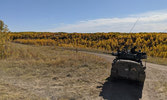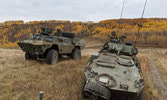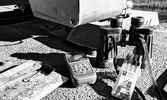Armoured Troop Warrant Officer Course
Supporting the Corps
By WO James Hamilton, SQMS
During the summer of 2020, the Regiment received word that it would be supporting an exported Armoured Troop Warrant Course (ATW). It wasted no time, and identified Recce Sqn as the lead for the running of the course. The ATW would run from end of August to beginning of October, which coincided with the Regimental Exercise, STEELE SABRE 20 (SS 20).
The course staff arrived a few days before the candidates and immediately got to work preparing for the students arrival. Both candidates and staff came from all over the country, with all three regular force regiments being well represented. After five days of theory in Edmonton, the course deployed to Wainwright for the practical portion. Due to COVID-19 restrictions in place, all candidates and staff had to adjust to some changes in living conditions and day to day life. With practice traces beginning the day after deploying to Wainwright, the course had to hit the ground running. The superb instruction from the staff allowed the candidates to quickly understand the requirements and duties of a troop WO within a Recce Sqn. With Recce Sqn being deployed on Ex SS 20, allowed the course to utilize a proper echelon for resupply, which greatly benefited the candidates. The course progressed well, with hard assess hot on the heels of the practice.
With such an important course being run, it drew some important guests. The course welcomed both the Corps Director and the Corps Sergeant Major and greatly benefited from their discussions on leadership, the future of the Corps, and the candidates future within it.
The Student Viewpoint
Sergeant Thomas Underwood, 62A
Following the interruptions to individual training in the wake of the COVID-19 pandemic, the Armoured School decided to export the DP3 Armour Troop Warrant Officer Course – Recce (ATW) to Edmonton to make up for lost time. Despite the course being run far from the Centre of Excellence, everything was familiar to an armour career course. Though, as it was a senior course, there was a distinct lack of yelling, undue stress, and deliberate confirmation of combat knowledge. This was a “gentlemen’s course”, “the only stress would be self-imposed” as the staff regularly repeated.
The course load was 12 students, sergeants from all three regiments. To save time the course was compressed into five weeks– which meant no weekends. The first week of the course was mostly theory lectures run out of the base Lecture Training Facility (LTF). The remaining four weeks of practical training were conducted in the Wainwright range training area (RTA) concurrently with the regiment’s annual cycle of primary combat function (PCF) courses – primarily the range portions of gunnery courses. Recce Squadron was tasked with directly supporting the course with vehicles, drivers, and sustainment. Some may have argued the efficacy of the last item when a heated administration tent housing the coffee pot could not be made available for the entire duration of the course – heresy.
The focus of the course was, in short, to effectively lead a reconnaissance troop in battle. To act as the Troop Leader in their absence, to make use of battle procedure, formulate a plan, and then to execute it. There were a few other steps in there too, but really it was all about making the plan and then remaking a new plan every time something didn’t go the way you had planned it – which was often the case. At least the weather cooperated; much to the students delight, and in stark contrast to the Gagetown norm, the weather was nearly perfect. It only rained once or twice and certainly not to the miserable level where one would have to switch from map markers to grease pencils on the trace.
Looking back, it was a lot to pack into four weeks of field training and really each student had such little time in the hot seat. In the end I realized that the course was more about confirming that we could do the job than it was about teaching us new skills. Disappointingly, there were no tightly guarded secrets to being a Troop WO; it’s about bringing experience to the table.




